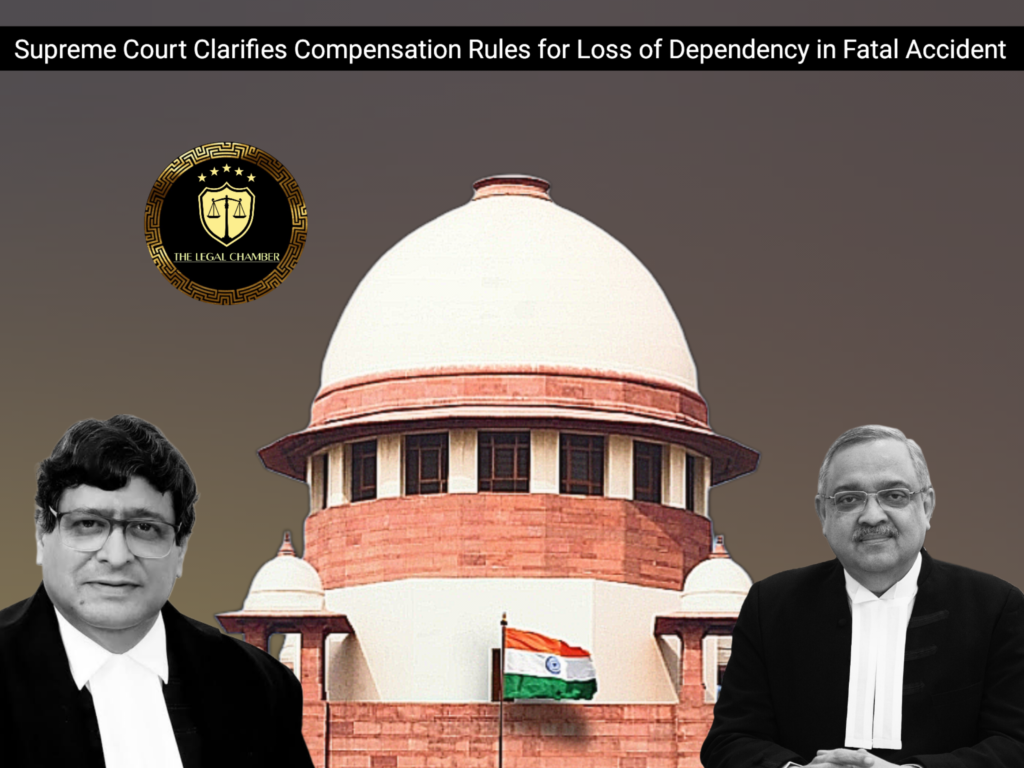
The Supreme Court upheld the High Court’s decision, affirming the Motor Accident Claims Tribunal’s award of ₹76.63 lakhs with 9% interest. It rejected the insurer’s plea to reduce the multiplier, holding that remarriage of the widow did not negate dependency claims of minor children. The Court also clarified that future prospects and interest apply from the claim filing date, emphasizing timely compensation. Delay in adjudication was not solely attributable to claimants, justifying the interest rate. The judgment reinforces precedent-based compensation principles in fatal accident cases.
Facts Of The Case:
The case involved a fatal motor accident that occurred on 18 November 1995, when a car collided with a truck due to the alleged rash and negligent driving of the truck driver. The deceased, a highly qualified engineer employed with British Telecom in the UK, was survived by his wife and two minor children. The dependents filed a claim before the Motor Accident Claims Tribunal (MACT), initially seeking ₹1 crore, later revised to ₹1.3 crore. The Tribunal held the truck driver negligent based on the FIR and an earlier claim award involving the car driver. It computed compensation at ₹79.04 lakhs, factoring in the deceased’s UK salary (converted to INR), a multiplier of 13, and deductions for personal expenses. The High Court later adjusted the exchange rate but largely upheld the award.The Insurance Company appealed, contesting negligence, multiplier applicability (arguing the widow’s remarriage in 2002 curtailed dependency), and the 9% interest rate. The Supreme Court dismissed the appeal, ruling that the minor children’s dependency persisted despite the widow’s remarriage. It upheld the multiplier, future prospects, and interest, noting delays in adjudication were not solely the claimants’ fault. The Court emphasized insurers should settle claims proactively to avoid interest liabilities. The final award stood at ₹76.63 lakhs with 9% interest from the claim filing date.
Procedural History:
The case originated with a claim petition filed before the Motor Accident Claims Tribunal (MACT) in 1995 by the deceased’s family seeking compensation for his death in a truck-car collision. The MACT awarded ₹79.04 lakhs in 2017, holding the truck driver negligent and calculating compensation based on the deceased’s UK salary, a 13-year multiplier, and conventional heads like loss of consortium. The Insurance Company appealed to the High Court, challenging negligence, multiplier applicability (citing the widow’s remarriage), and the 9% interest rate. The High Court partially modified the award in 2020, adjusting the currency conversion rate but retaining the multiplier and interest. Dissatisfied, the insurer filed a Special Leave Petition (SLP) in the Supreme Court (SLP(C) No.11340/2020), reiterating its objections. A connected SLP (No.22136/2024) contested interest on future prospects. In July 2025, the Supreme Court dismissed both SLPs, upholding the High Court’s decision and emphasizing timely compensation. It ruled that the multiplier rightly accounted for the children’s dependency, and the 9% interest was justified given the prolonged litigation, for which claimants weren’t solely responsible. The Court directed full payment within three months, failing which 12% interest would apply.
READ ALSO: Supreme Court Clarifies Rules for Senior Advocate Designation: Transparency vs. Discretion
Court Observation:
The Supreme Court made several key observations while dismissing the Insurance Company’s appeal. It upheld the 13-year multiplier, rejecting the insurer’s argument that the widow’s remarriage in 2002 terminated dependency, as the minor children’s financial needs persisted. The Court affirmed the 9% interest rate, noting that delays in adjudication—spanning from 1995 to 2017—were not solely attributable to the claimants and that such prolonged litigation warranted compensatory interest.The Bench criticized insurers for delaying settlements, emphasizing that provisional compensation could have mitigated the claimants’ hardship. It clarified that future prospects were rightly included in the calculation, as the compensation—though computed prospectively—was received belatedly, effectively negating any “early advantage.” The Court also underscored that interest on the award serves as restitution for the claimants’ prolonged deprivation of funds, particularly where insurers fail to settle claims promptly. Lastly, the judgment reinforced that legal delays cannot prejudice claimants without clear evidence of their culpability, and directed strict compliance with the payment timeline, attaching a 12% penalty interest for defaults. The ruling aligns with precedents balancing equitable compensation with accountability in motor accident claims.
Final Decision & Judgement:
The Supreme Court dismissed the Insurance Company’s appeals in both SLP(C) No.11340 of 2020 and SLP(C) No.22136 of 2024, upholding the High Court’s modified award of ₹76.63 lakhs with 9% interest from the date of the original claim petition in 1995. The Court rejected all contentions regarding the multiplier, dependency, and interest rate, ruling that the 13-year multiplier appropriately accounted for the deceased’s earning potential and the minor children’s ongoing dependency, irrespective of the widow’s remarriage. It affirmed the 9% interest as justified due to the inordinate 22-year delay in adjudication, which was not attributable to the claimants. The Bench imposed a strict 3-month deadline for payment, warning that default would attract a 12% penal interest on the entire awarded amount. The judgment reinforced insurers’ obligation to proactively settle meritorious claims and highlighted that future prospects and interest serve as vital compensation for claimants forced into prolonged litigation. The ruling closed all pending applications, delivering finality to this three-decade-old legal battle while setting a precedent for timely claim resolution in motor accident cases.
Case Details:
Case Title:The Oriental Insurance Co. Ltd. vs. Niru @ Niharika & Ors. Citation:2025 INSC 822 Case Number: Special Leave Petition (Civil) No. 11340 of 2020 Date of Judgment: July 14, 2025 Bench/Justices: Justice K. Vinod Chandran & Justice Sudhanshu Dhulia
Download The Judgement Here